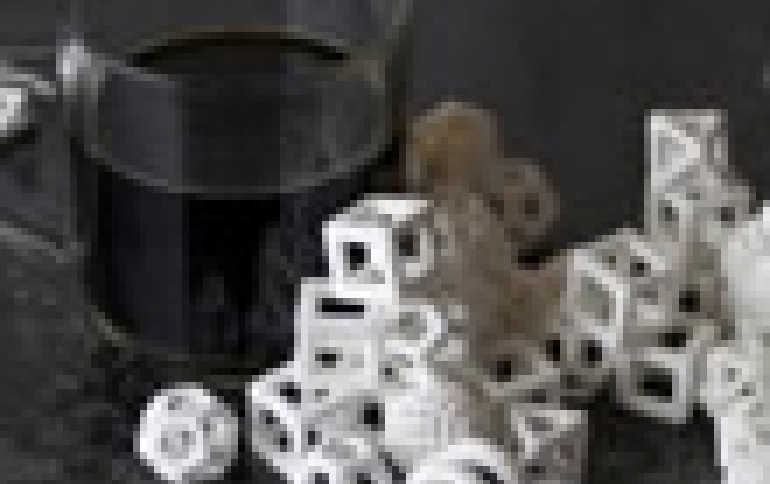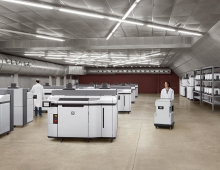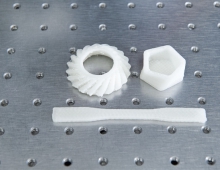
3D Printers at CES
3D printing sounds exotic in the ears of consumers but some companies tried to bring the technlology out of niche last week at CES.
3D printing is the automated process of making a
three-dimensional solid object of virtually any shape based on
a digital model.
3D Systems introduced the ChefJet series of 3D printers, launching a new, kitchen-ready 3D printer category for edibles. The first two printers in the series are the monochrome, countertop ChefJet 3D printer and the full-color, larger format ChefJet Pro 3D printer.
 The devices can be used as a companion for the professional
baker, cake master, and high-end event and restaurateur.
Equipped with The Digital Cookbook, ChefJet software for the
non-CAD user, the ChefJet printers enable edible prints to be
incorporated into any professional kitchen.
The devices can be used as a companion for the professional
baker, cake master, and high-end event and restaurateur.
Equipped with The Digital Cookbook, ChefJet software for the
non-CAD user, the ChefJet printers enable edible prints to be
incorporated into any professional kitchen.
The ChefJet 3D printer is a monochrome, countertop sized printer with a build volume of 8x8x6". ChefJet printable materials come in a variety of recipes, including chocolate, vanilla, mint, sour apple, cherry and watermelon.
3D Systems plans to release the ChefJet in the second half of 2014 and will be priced in the sub-$5,000 range.
The ChefJet Pro 3D printer is a full-color, large format printer with a build volume of 10x14x8". ChefJet Pro printable materials also come in a variety of recipes, including chocolate, vanilla, mint, sour apple, cherry and watermelon, all of which can be printed in full-color. ChefJet is expected to be available in the second half of 2014 and will be priced in the sub-$10,000 range.
New York-based printer manufacturer MakerBot unveiled at CES new models, including its biggest one yet, which is the size of a mini-fridge, costs $6,499 and can print objects the size of a human head. It also launched a smaller version, the Replicator Mini, which can create cupcake-sized objects. It will cost $1,375 when it launches this spring.
Taiwanese XYZprinting Inc. plans to sell its Da Vinci printer starting in March in the U.S. for $499.
The Taiwanese firm's entry-level 3D printer beat 27 other products to earn the endorsement from Reviewed.com, which presented the awards in partnership with CES organizers.
The MakerBot and Da Vinci printers take rolls of plastic wire and melt them, depositing tiny dots to create objects. The resulting pieces can be light and strong, but their surfaces show a characteristic banded texture and the resolution is limited. The light-curing models used by jewelers and engineers produce smooth objects with fine detail.
XFab, an Italian company that's made professional 3-D printers for a decade, demonstrated a $5,000 laser-powered model at the show, and said it is looking at launching a smaller, $2,500 model later this year.
The XFab laser 3D printer uses the Laser Stereolithography process. Its patented technology is capable of turning a much wider variety of materials into solid objects: acrylate resin, ABS, polypropylene, rigid opaque, transparent, ceramic and even rubber.
The system includes proprietary 3D editing software NAUTA XFAB Edition and it features high resolution printing, automatic support genaration and instant support removal.
XFab uses intelligent cartridge system for quick material change. The cartridge will retail for between $200 and $400.
According to Gartner, enterprise-class 3D printers will soon be available for under US$2,000, advising businesses to start experimenting with the technology to improve traditional design and prototyping methods.
3D Systems introduced the ChefJet series of 3D printers, launching a new, kitchen-ready 3D printer category for edibles. The first two printers in the series are the monochrome, countertop ChefJet 3D printer and the full-color, larger format ChefJet Pro 3D printer.
 The devices can be used as a companion for the professional
baker, cake master, and high-end event and restaurateur.
Equipped with The Digital Cookbook, ChefJet software for the
non-CAD user, the ChefJet printers enable edible prints to be
incorporated into any professional kitchen.
The devices can be used as a companion for the professional
baker, cake master, and high-end event and restaurateur.
Equipped with The Digital Cookbook, ChefJet software for the
non-CAD user, the ChefJet printers enable edible prints to be
incorporated into any professional kitchen.
The ChefJet 3D printer is a monochrome, countertop sized printer with a build volume of 8x8x6". ChefJet printable materials come in a variety of recipes, including chocolate, vanilla, mint, sour apple, cherry and watermelon.
3D Systems plans to release the ChefJet in the second half of 2014 and will be priced in the sub-$5,000 range.
The ChefJet Pro 3D printer is a full-color, large format printer with a build volume of 10x14x8". ChefJet Pro printable materials also come in a variety of recipes, including chocolate, vanilla, mint, sour apple, cherry and watermelon, all of which can be printed in full-color. ChefJet is expected to be available in the second half of 2014 and will be priced in the sub-$10,000 range.
New York-based printer manufacturer MakerBot unveiled at CES new models, including its biggest one yet, which is the size of a mini-fridge, costs $6,499 and can print objects the size of a human head. It also launched a smaller version, the Replicator Mini, which can create cupcake-sized objects. It will cost $1,375 when it launches this spring.
Taiwanese XYZprinting Inc. plans to sell its Da Vinci printer starting in March in the U.S. for $499.
The Taiwanese firm's entry-level 3D printer beat 27 other products to earn the endorsement from Reviewed.com, which presented the awards in partnership with CES organizers.
The MakerBot and Da Vinci printers take rolls of plastic wire and melt them, depositing tiny dots to create objects. The resulting pieces can be light and strong, but their surfaces show a characteristic banded texture and the resolution is limited. The light-curing models used by jewelers and engineers produce smooth objects with fine detail.
XFab, an Italian company that's made professional 3-D printers for a decade, demonstrated a $5,000 laser-powered model at the show, and said it is looking at launching a smaller, $2,500 model later this year.
The XFab laser 3D printer uses the Laser Stereolithography process. Its patented technology is capable of turning a much wider variety of materials into solid objects: acrylate resin, ABS, polypropylene, rigid opaque, transparent, ceramic and even rubber.
The system includes proprietary 3D editing software NAUTA XFAB Edition and it features high resolution printing, automatic support genaration and instant support removal.
XFab uses intelligent cartridge system for quick material change. The cartridge will retail for between $200 and $400.
According to Gartner, enterprise-class 3D printers will soon be available for under US$2,000, advising businesses to start experimenting with the technology to improve traditional design and prototyping methods.





















